Violence played a key role in the build-up to and aftermath of the French Revolution (May 1789).
Those who supported the overthrow of the monarchy and its state resorted to “popular violence” to overthrow the existing system, and also to defend themselves from the ruling system’s oppressive response to demands for political change; as well when embedding the new Republican system in place of the old against counter revolution. People’s armed militias were formed to defend the people from the royalist military. There were many violent protests and riots during the revolution.
Two of the defining events of the revolution involved grotesque violence. On the 14th of July 1789 a notorious state prison known as the Bastille, a symbol of royal rule, was attacked by an angry mob. The purpose of the attack was not so much to release the seven prisoners held there, but to secure the ammunition hidden behind the fort walls (it was also a military fort). The prison was overtaken after a violent battle and the prison governor beheaded. His head was then paraded on a spike around the streets of France. This event of political violence is until today celebrated every year as a national holiday (Bastille Day).
 On the 21st January 1793 deposed King Louis XVI was executed for treason and beheaded at the guillotine. A guard took his severed head and held it on display on the platform. The crowd cheered, threw their hats in the air and shouted “Vive La France”. His wife Queen Marie Antoinette was also decapitated on the 16th October 1793.
On the 21st January 1793 deposed King Louis XVI was executed for treason and beheaded at the guillotine. A guard took his severed head and held it on display on the platform. The crowd cheered, threw their hats in the air and shouted “Vive La France”. His wife Queen Marie Antoinette was also decapitated on the 16th October 1793.
After the revolution “the Reign of Terror “ began (1793-1794) when Jacobin leader Maximilien de Robespierre came to power in 1793. During this period, the rule of law was abandoned, and some 17,000 people were executed at the guillotine. Robespierre was not just a leader of the revolution; he was an ideologue and a passionate advocate for political violence. Robespierre defended terror as a virtue and necessity in pursuit of liberation and justice to defeat counter revolutionaries.
“If the mainspring of popular government in peacetime is virtue, the mainspring of popular government in revolution is both virtue and terror: virtue without which terror is disastrous; terror without which virtue is powerless. Terror is nothing but prompt, severe, inflexible justice; it is therefore an emanation of virtue…”
“to punish the oppressors of humanity: that is clemency; to forgive them is barbarity”
“Peoples do not judge in the same way as courts of law; they do not hand down sentences, they throw thunderbolts; they do not condemn kings, they drop them into the void; and this justice is worth as much as that of the courts”.
Robespierre eventually was also decapitated at the guillotine. The French obsession and culture for beheading was later exported and thousands of Algerian Muslims, and other people, were at the receiving end of the French political culture of “terrorism”.


Leave a Reply